初中英语人教版八年级下册unit4sectionA
合集下载
人教版八年级英语下册Unit4SectionA优秀教学案例

(五)作业小结
1. 教师布置作业,要求学生运用本节课所学知识,写一篇关于野生动物保护的短文。
2. 学生通过完成作业,进一步巩固本节课所学内容。
3. 教师对学生的作业进行批改和评价,了解学生的学习情况,为下一步教学提供依据。
五、教学反思
本节课通过情景创设、问题导向、小组合作等方式,引导学生关注野生动物的保护。在教学过程中,注重培养学生的语言运用能力、合作能力和批判性思维。通过总结归纳和作业小结,使学生巩固所学知识,提高他们的环保意识。但在实际教学中,还需注意关注学生的个体差异,因材施教,以提高教学效果。
在实际教学中,教师可以通过引入真实案例、组织小组讨论、进行角色扮演等方式,激发学生的学习兴趣,提高他们的语言运用能力。同时,教师还需关注学生的情感态度,引导他们树立正确的保护野生动物的意识。
二、教学目标
(一)知识与技能
1. 能够准确掌握本节课的核心词汇,如wildlife, protection, endanger等,并能够熟练运用这些词汇进行口语表达。
3. 通过举例和讲解,让学生了解野生动物保护的措施,如建立自然保护区、禁止非法捕猎等。
4. 引导学生关注人们对于野生动物保护的态度,如爱护动物、参与保护行动等。
(三)学生小组讨论
1. 教师将学生分成若干小组,每组选定一种野生动物,讨论该动物的保护措施。
2. 学生通过查阅资料、分享个人观点等方式,提出小组的看法和建议。
五、案例亮点
1. 创新情境教学法:本节课通过多媒体展示野生动物图片、播放保护区的视频等方式,创新情境教学法,让学生在真实的情境中学习,激发学生的学习兴趣,增强课堂教学的趣味性。
2. 任务型教学法:教师组织学生进行小组讨论,每组选定一种野生动物,讨论保护措施。学生通过查阅资料、分享个人观点等方式,完成任务。这种教学法培养了学生的合作能力、口头表达能力和问题解决能力。
1. 教师布置作业,要求学生运用本节课所学知识,写一篇关于野生动物保护的短文。
2. 学生通过完成作业,进一步巩固本节课所学内容。
3. 教师对学生的作业进行批改和评价,了解学生的学习情况,为下一步教学提供依据。
五、教学反思
本节课通过情景创设、问题导向、小组合作等方式,引导学生关注野生动物的保护。在教学过程中,注重培养学生的语言运用能力、合作能力和批判性思维。通过总结归纳和作业小结,使学生巩固所学知识,提高他们的环保意识。但在实际教学中,还需注意关注学生的个体差异,因材施教,以提高教学效果。
在实际教学中,教师可以通过引入真实案例、组织小组讨论、进行角色扮演等方式,激发学生的学习兴趣,提高他们的语言运用能力。同时,教师还需关注学生的情感态度,引导他们树立正确的保护野生动物的意识。
二、教学目标
(一)知识与技能
1. 能够准确掌握本节课的核心词汇,如wildlife, protection, endanger等,并能够熟练运用这些词汇进行口语表达。
3. 通过举例和讲解,让学生了解野生动物保护的措施,如建立自然保护区、禁止非法捕猎等。
4. 引导学生关注人们对于野生动物保护的态度,如爱护动物、参与保护行动等。
(三)学生小组讨论
1. 教师将学生分成若干小组,每组选定一种野生动物,讨论该动物的保护措施。
2. 学生通过查阅资料、分享个人观点等方式,提出小组的看法和建议。
五、案例亮点
1. 创新情境教学法:本节课通过多媒体展示野生动物图片、播放保护区的视频等方式,创新情境教学法,让学生在真实的情境中学习,激发学生的学习兴趣,增强课堂教学的趣味性。
2. 任务型教学法:教师组织学生进行小组讨论,每组选定一种野生动物,讨论保护措施。学生通过查阅资料、分享个人观点等方式,完成任务。这种教学法培养了学生的合作能力、口头表达能力和问题解决能力。
八年级英语下册(人教新目标GoForIt!)Unit4第1课时SectionA(1a2d)教学设计

三、教学重难点和教学设想
(一)教学重难点
1.重点:本章节的重点在于让学生掌握现在进行时态的用法,并能将其应用于实际场景中进行交流。
难点:如何让学生在实际语境中灵活运用现在进行时态,以及如何提高他们的听说能力。
2.重点:培养学生通过观察、猜测和交流获取信息的能力。
难点:如何引导学生运用所学知识进行有效的信息获取和处理。
3.教师挑选部分学生的作业进行展示和讲评,帮助学生发现并改正错误。
4.针对不同层次的学生,教师设计难易适度的拓展练习,提高他们的语言运用能力。
(五)总结归纳
1.教师引导学生回顾本节课所学内容,总结现在进行时态的用法和特点。
2.学生分享学习心得,互相交流学习方法和技巧。
3.教师强调本节课的重点,提醒学生课后加强练习。
八年级英语下册(人教新目标GoForIt!)Unit4第1课时SectionA(1a2d)教学设计
一、教学目标
(一)知识与技能
在本章节的学习中,学生将掌握以下知识与技能:
1.能够理解和运用表示动作的现在进行时态,如“Is he/she/it…? Yes, he/she/it is. No, he/she/it isn't.”,并能在实际场景中进行灵活运用。
在本章节的学习过程中,学生将通过以下方法提升自己的英语能力:
1.采用任务型教学法,让学生在完成具体任务的过程中,自主探究、合作交流,提高英语听说能力。
2.利用图片、实物等教学资源,引导学生观察、思考、表达,培养他们的观察能力和思维能力。
3.通过角色扮演、小组讨论等形式,激发学生的表达欲望,提高他们的口语表达能力。
4.通过学习英语,拓宽学生的国际视野,让他们了解不同国家的文化,培养跨文化交际能力。
(一)教学重难点
1.重点:本章节的重点在于让学生掌握现在进行时态的用法,并能将其应用于实际场景中进行交流。
难点:如何让学生在实际语境中灵活运用现在进行时态,以及如何提高他们的听说能力。
2.重点:培养学生通过观察、猜测和交流获取信息的能力。
难点:如何引导学生运用所学知识进行有效的信息获取和处理。
3.教师挑选部分学生的作业进行展示和讲评,帮助学生发现并改正错误。
4.针对不同层次的学生,教师设计难易适度的拓展练习,提高他们的语言运用能力。
(五)总结归纳
1.教师引导学生回顾本节课所学内容,总结现在进行时态的用法和特点。
2.学生分享学习心得,互相交流学习方法和技巧。
3.教师强调本节课的重点,提醒学生课后加强练习。
八年级英语下册(人教新目标GoForIt!)Unit4第1课时SectionA(1a2d)教学设计
一、教学目标
(一)知识与技能
在本章节的学习中,学生将掌握以下知识与技能:
1.能够理解和运用表示动作的现在进行时态,如“Is he/she/it…? Yes, he/she/it is. No, he/she/it isn't.”,并能在实际场景中进行灵活运用。
在本章节的学习过程中,学生将通过以下方法提升自己的英语能力:
1.采用任务型教学法,让学生在完成具体任务的过程中,自主探究、合作交流,提高英语听说能力。
2.利用图片、实物等教学资源,引导学生观察、思考、表达,培养他们的观察能力和思维能力。
3.通过角色扮演、小组讨论等形式,激发学生的表达欲望,提高他们的口语表达能力。
4.通过学习英语,拓宽学生的国际视野,让他们了解不同国家的文化,培养跨文化交际能力。
人教版八年级英语下册 Unit 4 SectionA 3a-3c

A. advice on solving family problems B. advice on how to communicate with others C. problems on how to get on well with family
He writes a letter to Robert Hunt to talk about his problems.
Section A 3a-3c
Unit 4 Why don't you talk to your parents?
Do you have a good relation between your parents ? What problems can you meet at home?
Pre-reading
Advice
To (2) __t_al_k_a_b_o_u_t__ these feelings with his family.
About his parents
About his elder brother
1. He should (3) _o_f_fe_r_t_o_h_e_l_p_ if 1. He should sit down and
ymoourecaanccguertattheelyinafnodrmqauatircioeknplyy.lyouf'rreolmooking for 如果你了解文章的结构R,ob你e就rt能H更u准n确t 、更快
地得到你要找的信息。
Warming-up Pre-reading While-reading Post-reading Homework
He feels (11) _l_o_n_el_y_a_n_d__n_e_rv_o_u_s_._
He writes a letter to Robert Hunt to talk about his problems.
Section A 3a-3c
Unit 4 Why don't you talk to your parents?
Do you have a good relation between your parents ? What problems can you meet at home?
Pre-reading
Advice
To (2) __t_al_k_a_b_o_u_t__ these feelings with his family.
About his parents
About his elder brother
1. He should (3) _o_f_fe_r_t_o_h_e_l_p_ if 1. He should sit down and
ymoourecaanccguertattheelyinafnodrmqauatircioeknplyy.lyouf'rreolmooking for 如果你了解文章的结构R,ob你e就rt能H更u准n确t 、更快
地得到你要找的信息。
Warming-up Pre-reading While-reading Post-reading Homework
He feels (11) _l_o_n_el_y_a_n_d__n_e_rv_o_u_s_._
2020-2021学年人教版英语八年级下册Unit4SectionA1a—2d教案
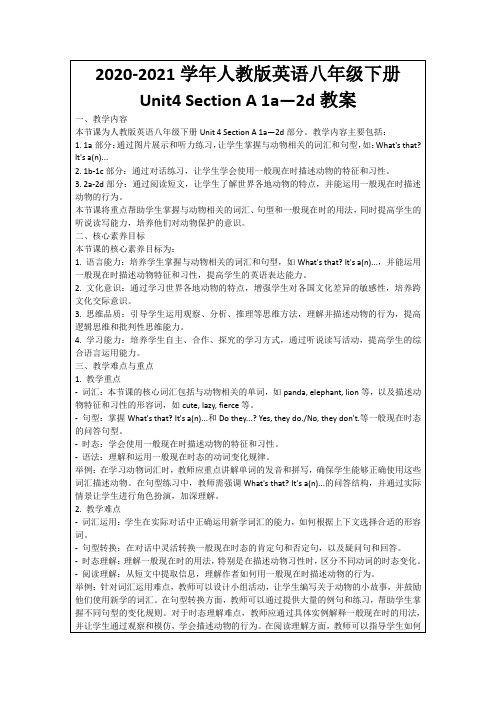
二、核心素养目标
本节课的核心素养目标为:
1.语言能力:培养学生掌握与动物相关的词汇和句型,如What's that? It's a(n)...,并能运用一般现在时描述动物特征和习性,提高学生的英语表达能力。
2.文化意识:通过学习世界各地动物的特点,增强学生对各国文化差异的敏感性,培养跨文化交际意识。
3.思维品质:引导学生运用观察、分析、推理等思维方法,理解并描述动物的行为,提高逻辑思维和批判性思维能力。
4.学习能力:培养学生自主、合作、探究的学习方式,通过听说读写活动,提高学生的综合语言运用能力。
三、教学难点与重点
1.教学重点
-词汇:本节课的核心词汇包括与动物相关的单词,如panda, elephant, lion等,以及描述动物特征和习性的形容词,如cute, lazy, fierce等。
2020-2021学年人教版英语八年级下册Unit4 Section A 1a—2d教案
一、教学内容
本节课为人教版英语八年级下册Unit 4 Section A 1a—2d部分。教学内容主要包括:
1. 1a部分:通过图片展示和听力练习,让学生掌握与动物相关的词汇和句型,如:What's that? It's a(n)...
五、教学反思
在今天的教学过程中,我发现学生们对于动物词汇的学习非常感兴趣,他们积极参与到课堂活动中,踊跃回答问题。通过图片和实际情景的展示,学生们能够更好地记忆和理解新词汇。然而,我也注意到,在运用一般现在时态描述动物特征和习性时,部分学生还存在一定的困难。
首先,对于词汇的掌握,我认为可以继续采用图片、实物等直观教具,帮助学生加深印象。同时,结合课后作业,让学生多读、多写,巩固所学词汇。
本节课的核心素养目标为:
1.语言能力:培养学生掌握与动物相关的词汇和句型,如What's that? It's a(n)...,并能运用一般现在时描述动物特征和习性,提高学生的英语表达能力。
2.文化意识:通过学习世界各地动物的特点,增强学生对各国文化差异的敏感性,培养跨文化交际意识。
3.思维品质:引导学生运用观察、分析、推理等思维方法,理解并描述动物的行为,提高逻辑思维和批判性思维能力。
4.学习能力:培养学生自主、合作、探究的学习方式,通过听说读写活动,提高学生的综合语言运用能力。
三、教学难点与重点
1.教学重点
-词汇:本节课的核心词汇包括与动物相关的单词,如panda, elephant, lion等,以及描述动物特征和习性的形容词,如cute, lazy, fierce等。
2020-2021学年人教版英语八年级下册Unit4 Section A 1a—2d教案
一、教学内容
本节课为人教版英语八年级下册Unit 4 Section A 1a—2d部分。教学内容主要包括:
1. 1a部分:通过图片展示和听力练习,让学生掌握与动物相关的词汇和句型,如:What's that? It's a(n)...
五、教学反思
在今天的教学过程中,我发现学生们对于动物词汇的学习非常感兴趣,他们积极参与到课堂活动中,踊跃回答问题。通过图片和实际情景的展示,学生们能够更好地记忆和理解新词汇。然而,我也注意到,在运用一般现在时态描述动物特征和习性时,部分学生还存在一定的困难。
首先,对于词汇的掌握,我认为可以继续采用图片、实物等直观教具,帮助学生加深印象。同时,结合课后作业,让学生多读、多写,巩固所学词汇。
人教版八年级英语下册 Uni4_SectionA_语境法讲解单词

编码 what(什么)+ ever(永远)→无论什么
nervous ['nɜ:(r)vəs] adj. 焦虑的; 担忧的
用法 固定搭配: be/feel nervous about/at sth. 因为某事而心中忐忑不安 be nervous of 有点害怕
例句 Don't be so nervous.
练练不忘
(2018宜昌改编)—In the past five years, China has played an important role in the Belt and Road. —It has offered many nations a great chance __to__c_o_m_m__u_n_i_c_a_te__ (communicate).
例句 This is obviously wrong.
比较 强烈(strong)反对错误(wrong)观点。
guess [ges] v. 猜测; 估计
例句 I guess it couldn't matter. 比较 客人(guest)说:猜猜(guess)我是谁?
deal [di:l] n. 协议; 交易
用法 同根词:cloudy adj.多云的,阴天的 例句 A dark cloud passed over the sky. 比较 乌云(cloud)可以(could)蔽日。
elder ['eldə(r)] adj. 年纪较长的
用法 elder 只可指人,用来比较年龄长幼,尤指兄弟姐妹的长幼关系,
communication [kəmˌju:nɪ'keɪʃn] n. 交流; 沟通
用法 同根词:communicate v. 交流
nervous ['nɜ:(r)vəs] adj. 焦虑的; 担忧的
用法 固定搭配: be/feel nervous about/at sth. 因为某事而心中忐忑不安 be nervous of 有点害怕
例句 Don't be so nervous.
练练不忘
(2018宜昌改编)—In the past five years, China has played an important role in the Belt and Road. —It has offered many nations a great chance __to__c_o_m_m__u_n_i_c_a_te__ (communicate).
例句 This is obviously wrong.
比较 强烈(strong)反对错误(wrong)观点。
guess [ges] v. 猜测; 估计
例句 I guess it couldn't matter. 比较 客人(guest)说:猜猜(guess)我是谁?
deal [di:l] n. 协议; 交易
用法 同根词:cloudy adj.多云的,阴天的 例句 A dark cloud passed over the sky. 比较 乌云(cloud)可以(could)蔽日。
elder ['eldə(r)] adj. 年纪较长的
用法 elder 只可指人,用来比较年龄长幼,尤指兄弟姐妹的长幼关系,
communication [kəmˌju:nɪ'keɪʃn] n. 交流; 沟通
用法 同根词:communicate v. 交流
Unit+4++SectionA+3a-3c 人教版英语八年级下册+

Unit 4 Why don’t you
talk to your parents?
Section A 3a-3c
R·八年级下册
Learning objectives
Words and expressions: get on with, relation, communication, argue, cloud, elder, instead, whatever, nervous, offer, proper, secondly, communicate, explain, clear Ability aims: Use the knowledge we learned to talk about the problems
Brainstorm
We all have problems in our daily life.
Say as many problems as you can!
Problems
I have too much homework. I have too many after-school classes. I get into a fight with my brother. I argue with my best friend. 与……吵架 I can’t get good grades in English. I can’t hang out with friends. The relation is very difficult. 关系 I can’t get on well with my parents. 和睦相处
When they argue, it’s like a
_b_i_g_,_b_l_a_c_k_ cloudh_a_n_g__in_g__o_v_e_rour
talk to your parents?
Section A 3a-3c
R·八年级下册
Learning objectives
Words and expressions: get on with, relation, communication, argue, cloud, elder, instead, whatever, nervous, offer, proper, secondly, communicate, explain, clear Ability aims: Use the knowledge we learned to talk about the problems
Brainstorm
We all have problems in our daily life.
Say as many problems as you can!
Problems
I have too much homework. I have too many after-school classes. I get into a fight with my brother. I argue with my best friend. 与……吵架 I can’t get good grades in English. I can’t hang out with friends. The relation is very difficult. 关系 I can’t get on well with my parents. 和睦相处
When they argue, it’s like a
_b_i_g_,_b_l_a_c_k_ cloudh_a_n_g__in_g__o_v_e_rour
人教版英语八年级下册第4单元Unit 4 Section A (3a-4c)

人教版英语八年级下册第4单元Unit 4 Section A (3a-4c)
【用法辨析】instead与instead of的异同
为副词, 通常放在句首或 句末, 在句首时常用逗号 instead 隔开, 表示前面的事没做, 而做了后面的事
He didn’t go to school. Instead, he went to the cinema. 他没有去学校, 相反他去了电影院。
人教版英语八年级下册第4单元Unit 4 Section A (3a-4c)
【活学活用】
①—What’s wrong with you?
—Yesterday I argued __________Tony _________the thing.
A. to; about
B. for; about
C. with; about
Unit 4 Why don’t you talk to your parents?
Section A (3a-4c)
人教版英语八年级下册第4单元Unit 4 Section A (3a-4c)
Ⅰ. 短语互译 1. copy one’s homework 2. feel lonely 3. be worried about 4. 交流 5. 拒绝做某事 答案: 1. 抄某人的作业 2. 感到孤独 3. 担心 4. communicate with 5. refuse to do sth.
人教版英语八年级下册第4单元Unit 4 Section A (3a-4c)
(1)argue with sb. “为……与某人争辩”。例如: Mary often argues with her friends about math problems. 玛丽经常和朋友辩论数学问题。 (2)argue about/on sth. “争论某事”。例如: Next class we’re arguing about family activities. 下节课我们辩论家庭活动。 (3)argue sb. into/out of doing sth. 说服某人做/不做某事。例如: He argued his father out of smoking. 他说服父亲不要吸烟。
【用法辨析】instead与instead of的异同
为副词, 通常放在句首或 句末, 在句首时常用逗号 instead 隔开, 表示前面的事没做, 而做了后面的事
He didn’t go to school. Instead, he went to the cinema. 他没有去学校, 相反他去了电影院。
人教版英语八年级下册第4单元Unit 4 Section A (3a-4c)
【活学活用】
①—What’s wrong with you?
—Yesterday I argued __________Tony _________the thing.
A. to; about
B. for; about
C. with; about
Unit 4 Why don’t you talk to your parents?
Section A (3a-4c)
人教版英语八年级下册第4单元Unit 4 Section A (3a-4c)
Ⅰ. 短语互译 1. copy one’s homework 2. feel lonely 3. be worried about 4. 交流 5. 拒绝做某事 答案: 1. 抄某人的作业 2. 感到孤独 3. 担心 4. communicate with 5. refuse to do sth.
人教版英语八年级下册第4单元Unit 4 Section A (3a-4c)
(1)argue with sb. “为……与某人争辩”。例如: Mary often argues with her friends about math problems. 玛丽经常和朋友辩论数学问题。 (2)argue about/on sth. “争论某事”。例如: Next class we’re arguing about family activities. 下节课我们辩论家庭活动。 (3)argue sb. into/out of doing sth. 说服某人做/不做某事。例如: He argued his father out of smoking. 他说服父亲不要吸烟。
人教版八年级下册英语Unit4SectionA(1a1c)优秀教学案例

人教版八年级下册英语Unit4SectionA(1a1c)优秀教学案例
一、案例背景
在我国教育改革的大背景下,英语课程教学逐渐从传统的语法翻译法转向以学生为中心的交际法。人教版八年级下册英语Unit4 Section A (1a-1c)的教学内容围绕着“家务劳动”这一主题,旨在帮助学生掌握与家务相关的词汇和句型,并能运用所学进行真实情境下的交流。本案例以该单元为载体,结合学生的生活经验和认知水平,运用任务型教学法,提升学生的英语实际运用能力。
3.教学过程:
(1)教师展示与家务劳动相关的图片,引导学生学习词汇和句型。
(2)教师创设情境,让学生运用一般现在时描述家庭成员的日常家务活动。
(3)教师通过示例、讲解、练习等形式,帮助学生掌握语法知识。
(三)学生小组讨论
1.教学活动:将学生分成小组,让他们围绕家务劳动主题进行讨论,如:“What chores do you do at home? Can you describe your family members' chores?”等。
(二)问题导向
以问题为导向的教学策略可以激发学生的思考,培养他们的问题解决能力。在本章节的教学中,我将设计一系列与家务劳动相关的问题,如:“What do you do at home? Can you describe your family members' chores?”等,引导学生运用所学词汇和句型进行回答。通过这种方式,让学生在实际情境中运用英语,提高他们的语言表达能力。
2.教学目的:让学生对家务劳动产生兴趣,为新课的学习做好铺垫。
(二)讲授新知
1.教学内容:针对本节课的词汇和句型进行讲解,如clean the room, make the bed, wash the dishes等,并结合一般现在时介绍家庭成员的日常家务活动。
一、案例背景
在我国教育改革的大背景下,英语课程教学逐渐从传统的语法翻译法转向以学生为中心的交际法。人教版八年级下册英语Unit4 Section A (1a-1c)的教学内容围绕着“家务劳动”这一主题,旨在帮助学生掌握与家务相关的词汇和句型,并能运用所学进行真实情境下的交流。本案例以该单元为载体,结合学生的生活经验和认知水平,运用任务型教学法,提升学生的英语实际运用能力。
3.教学过程:
(1)教师展示与家务劳动相关的图片,引导学生学习词汇和句型。
(2)教师创设情境,让学生运用一般现在时描述家庭成员的日常家务活动。
(3)教师通过示例、讲解、练习等形式,帮助学生掌握语法知识。
(三)学生小组讨论
1.教学活动:将学生分成小组,让他们围绕家务劳动主题进行讨论,如:“What chores do you do at home? Can you describe your family members' chores?”等。
(二)问题导向
以问题为导向的教学策略可以激发学生的思考,培养他们的问题解决能力。在本章节的教学中,我将设计一系列与家务劳动相关的问题,如:“What do you do at home? Can you describe your family members' chores?”等,引导学生运用所学词汇和句型进行回答。通过这种方式,让学生在实际情境中运用英语,提高他们的语言表达能力。
2.教学目的:让学生对家务劳动产生兴趣,为新课的学习做好铺垫。
(二)讲授新知
1.教学内容:针对本节课的词汇和句型进行讲解,如clean the room, make the bed, wash the dishes等,并结合一般现在时介绍家庭成员的日常家务活动。
Unit4SectionA(GrammarFocus4c)课件初中英语人教版新目标八年级下册(1)
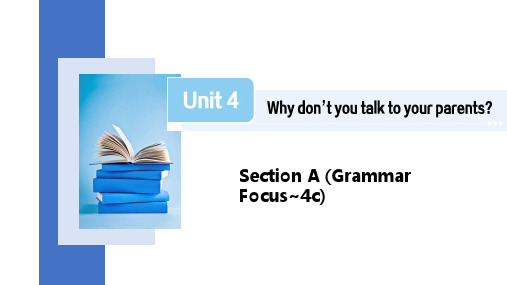
一、译一译 1.尽管她错了,但这不是什么大事。 Although she's wrong, it's not a big deal. 2.抄袭其他人的作业是不对的。 Copying others' homework is wrong.
3.你害怕在人们面前讲话。 You are afraid of speaking in front of people.
I won't copy his homework anymore.我不会再抄他的作业了。 My father didn't smoke anymore.=My father no more smoked. 我爸爸不再抽烟了。
小组合作 我为智囊团
1.翻译下列句子。
(1)你把作业忘在家里了。
You left your homework at home
— Why don't
you call him up?
(3)—I am really tired because I studied until midnight last
night. — You'd better go to sleep earlier this evening.
(4)—I don't want to swim tomorrow. — What about/ How about playing basketball? (5) You'd better nottalk to her when she is very angry.
although,but并完成下面的填空。
(1) until + 时间状语,表示“一直到……(时候)”。 (2) although 既可放句首也可放句中,表示“虽然;尽管”。 (3) so that 通常放在句中连接两个句子,其后接结果,表示
人教版八年级下册英语 UNIT4 SectionA (3a-3c)
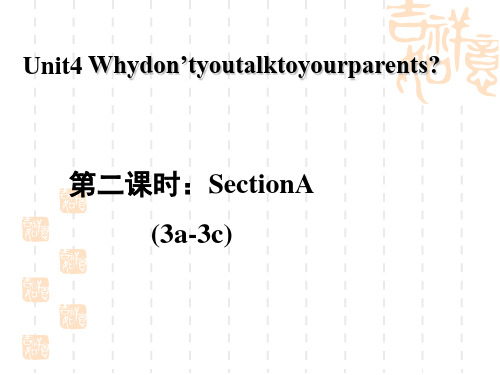
—Ihearthemanager herefusedit.(泰安)
B himagoodjob, but
A. showed
B. offered
C. passedD. paid
Maybeyoucoulddomorejobsaroundthe 知识点 7 housesothattheyhavemoretimeforprop
r 的或年龄较大的
在句中只作 定语 在句中可作 定语和表语
e.g. Myelderbrotherisoneyearolderthanme. 我哥哥比我大一岁。
知识点
5
Insteadhewatcheswhateverhewan tsuntillateatnight.
考点5 instead/ɪn'sted/adv. 代替;反而;却
getalongwithn—er_v_o_u_s______W__h_a_t_'_ss_h_e_s_o_n_e_r_v_o_u_s_a_b_o_u_t_?_
____________________ getonwith
Lindagotonwellwith
herparents.
知识点
1
MyproblemisthatIcan’tgetonwithmyfa mily.
Whatever(=Nomatterwhat) difficultieshemaymeet, hewillovercomethem. 无 论他可能遇到什么困难,他都会克服它们。
典例 ____A____Ido, Idoitforyou. Donoteverdoubtthat, myboy. [无锡] A. WhateverB. Wherever C. WheneverD. Whoever
Unit4 SectionA(3a-3c)课件2022-2023学年人教版八年级英语下册

2. Why don’t you sit down
(T)3p.Wrohbelenmhsis,
parents the boy
are having should do
Байду номын сангаас
more housework to cheer them up.
and communicate with your brother?
Sad and Thirteen’s main problem Robert Hunt’s advice
the boy’s problem and his feeling about it.
Sad and Thirteen’s main(主要的) problem
Sad and Thirteen’s feeling
My problem is that I can’t get on with my family.
Problems
Sad and Thirteen
Advice
Robert Hunt
threea1dsitngletstterartegy(阅读技巧):the theme sentence(主题句) is
Lalewtatyesrat the beginning or at the end of the paragraph. for help
parents have become
Maybe you could do more jobs
dTifhfeiycufltig.ht a lot.
around the house so that they have more time for proper
About
elder brother
(T)3p.Wrohbelenmhsis,
parents the boy
are having should do
Байду номын сангаас
more housework to cheer them up.
and communicate with your brother?
Sad and Thirteen’s main problem Robert Hunt’s advice
the boy’s problem and his feeling about it.
Sad and Thirteen’s main(主要的) problem
Sad and Thirteen’s feeling
My problem is that I can’t get on with my family.
Problems
Sad and Thirteen
Advice
Robert Hunt
threea1dsitngletstterartegy(阅读技巧):the theme sentence(主题句) is
Lalewtatyesrat the beginning or at the end of the paragraph. for help
parents have become
Maybe you could do more jobs
dTifhfeiycufltig.ht a lot.
around the house so that they have more time for proper
About
elder brother
人教版八年级英语下册Unit4SectionA(3a3c)优秀教学案例
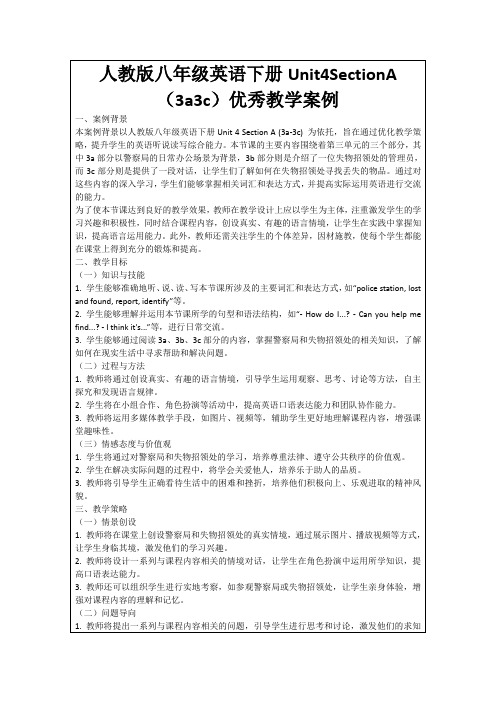
(五)作业小结
1.教师将布置与本节课相关的作业,让学生在课后巩固所学知识,提高实际运用能力。
2.教师将提醒学生在完成作业时要注意的问题,如词汇的拼写、语法的正确运用等。
3.教师将鼓励学生在课后进行自主学习,如通过阅读相关资料、观看英语视频等,提高英语综合能力。
五、案例亮点
1.情境创设:本节课通过展示警察局和失物招领处的真实情境,让学生身临其境,增强学生的学习兴趣和积极性。这种情境创设的方式不仅有助于学生对课程内容的理解,还能提高他们的口语表达能力和实际应用能力。
2.教师还可以设计一些任务型活动,让学生在完成任务的过程中,自主探究和解决问题。
3.教师将关注学生的回答和反馈,及时引导和纠正,确保学生对课程内容的理解和掌握。
(三)小组合作
1.教师将组织学生进行小组合作,让他们在小组活动中共同完成任务,提高团队协作能力。
2.教师将为每个小组提供必要的支持和指导,确保他们能够顺利完成任务。
为了使本节课达到良好的教学效果,教师在教学设计上应以学生为主体,注重激发学生的学习兴趣和积极性,同时结合课程内容,创设真实、有趣的语言情境,让学生在实践中掌握知识,提高语言运用能力。此外,教师还需关注学生的个体差异,因材施教,使每个学生都能在课堂上得到充分的锻炼和提高。
二、教学目标
(一)知识与技能
1.学生能够准确地听、说、读、写本节课所涉及的主要词汇和表达方式,如“police station, lost and found, report, identify”等。
四、教学内容与过程
(一)导入新课
1.教师将通过展示一幅警察局的照片,引导学生思考:“你们对警察局有什么了解?”,以此导入新课。
2.教师将继续提问:“如果你们丢失了物品,你们会如何寻找?”从而引出本节课的主题——失物招领处。
1.教师将布置与本节课相关的作业,让学生在课后巩固所学知识,提高实际运用能力。
2.教师将提醒学生在完成作业时要注意的问题,如词汇的拼写、语法的正确运用等。
3.教师将鼓励学生在课后进行自主学习,如通过阅读相关资料、观看英语视频等,提高英语综合能力。
五、案例亮点
1.情境创设:本节课通过展示警察局和失物招领处的真实情境,让学生身临其境,增强学生的学习兴趣和积极性。这种情境创设的方式不仅有助于学生对课程内容的理解,还能提高他们的口语表达能力和实际应用能力。
2.教师还可以设计一些任务型活动,让学生在完成任务的过程中,自主探究和解决问题。
3.教师将关注学生的回答和反馈,及时引导和纠正,确保学生对课程内容的理解和掌握。
(三)小组合作
1.教师将组织学生进行小组合作,让他们在小组活动中共同完成任务,提高团队协作能力。
2.教师将为每个小组提供必要的支持和指导,确保他们能够顺利完成任务。
为了使本节课达到良好的教学效果,教师在教学设计上应以学生为主体,注重激发学生的学习兴趣和积极性,同时结合课程内容,创设真实、有趣的语言情境,让学生在实践中掌握知识,提高语言运用能力。此外,教师还需关注学生的个体差异,因材施教,使每个学生都能在课堂上得到充分的锻炼和提高。
二、教学目标
(一)知识与技能
1.学生能够准确地听、说、读、写本节课所涉及的主要词汇和表达方式,如“police station, lost and found, report, identify”等。
四、教学内容与过程
(一)导入新课
1.教师将通过展示一幅警察局的照片,引导学生思考:“你们对警察局有什么了解?”,以此导入新课。
2.教师将继续提问:“如果你们丢失了物品,你们会如何寻找?”从而引出本节课的主题——失物招领处。
人教版八年级英语下册Unit 4 Section A Grammar Focus-4c 课件

做作业,不 能出去玩!
Practice
Grammar Focus
① 你看上去很疲劳,怎么了? You l_o_o_k_ tired. What’s _th__e__ _m__a_tt_e_r_?
② 昨晚,我一直学习到午夜,因此我没有睡足觉。
I studiedu_n_t_il__m_i_d_n_ig_h_t__ last night so I didn’tg_e_t_e_n_o_u_g_h_ sleep.
angry _s_o__th__a_t she’ll ask you next time.
2. A: I don’t have any friends at my new school. What should I do?
B: _A_l_t_h_o_u_g_h_ you don’t have any now, you
so that
so that:“以便,为了”, 引导目的状语从句,从句中 的谓语动词一般和can, could, may, might等情态动词 连用。
1) Tell me her address so that I can go and see her. 他们可以帮忙照料孩子,这样你就可以歇一歇了。
• until引导的从句,主句为一般将来时,从句要用一般现在 时表示将来。
直到闹钟响了我才起来。 I didn’t wake up until I heard the alarm clock. 我会等你等到七点。 I will wait you until seven o’clock.
until
until引导时间状语从句,用于肯定句时,意为“直 到……为止”,主句中的谓语动词用延续性动词。
注意: so...that.. 以至于;结果。引导结果状语从句 He was so excited that he couldn’t go to sleep.
Practice
Grammar Focus
① 你看上去很疲劳,怎么了? You l_o_o_k_ tired. What’s _th__e__ _m__a_tt_e_r_?
② 昨晚,我一直学习到午夜,因此我没有睡足觉。
I studiedu_n_t_il__m_i_d_n_ig_h_t__ last night so I didn’tg_e_t_e_n_o_u_g_h_ sleep.
angry _s_o__th__a_t she’ll ask you next time.
2. A: I don’t have any friends at my new school. What should I do?
B: _A_l_t_h_o_u_g_h_ you don’t have any now, you
so that
so that:“以便,为了”, 引导目的状语从句,从句中 的谓语动词一般和can, could, may, might等情态动词 连用。
1) Tell me her address so that I can go and see her. 他们可以帮忙照料孩子,这样你就可以歇一歇了。
• until引导的从句,主句为一般将来时,从句要用一般现在 时表示将来。
直到闹钟响了我才起来。 I didn’t wake up until I heard the alarm clock. 我会等你等到七点。 I will wait you until seven o’clock.
until
until引导时间状语从句,用于肯定句时,意为“直 到……为止”,主句中的谓语动词用延续性动词。
注意: so...that.. 以至于;结果。引导结果状语从句 He was so excited that he couldn’t go to sleep.
人教版八年级英语下册课件Unit 4 Section A (1a~2d)

A. allow
B. allowed
C.not allowed
2. 我父母不允许我晚上出去。(根据汉语意思完成句子,
词数不限)
My parents don’t allow me to go out at night.
“find+sb.+宾语补足语”的用法 “find+sb.+宾语补足语”意为“发现某人……”,其中宾 语补足语可由分词、形容词、名词短语、介词短语或不 定式充当。 1. find sb. / sth.doing (现在分词) sth.,意为“发现某人 / 某物正在做某事”。如: I found him stealing my mobile phone. 我发现他正在偷 我的手机。
2. 几乎没有人可以解决这个问题。 Almost no one can work out this problem.
3. 约翰过去为我工作。 John used to work for me.
4. 我的妈妈是一名护士。 My mother works as a nurse.
一、根据句意及首字母或中文提示,用单词的适当形式 填空 1. What’s wrong with Tina. She looks very pale.
It’s wrong of you to look through others’ things
without being allowed.
7. 昨晚我打电话给你,可没人接。
I tried to call you up
last night, but no
one answered the phone .
9. 重要的事 big deal
10. 成功地发展;解决 work out
人教版八年级英语下册Unit4SectionA(3a3c)课堂教学设计
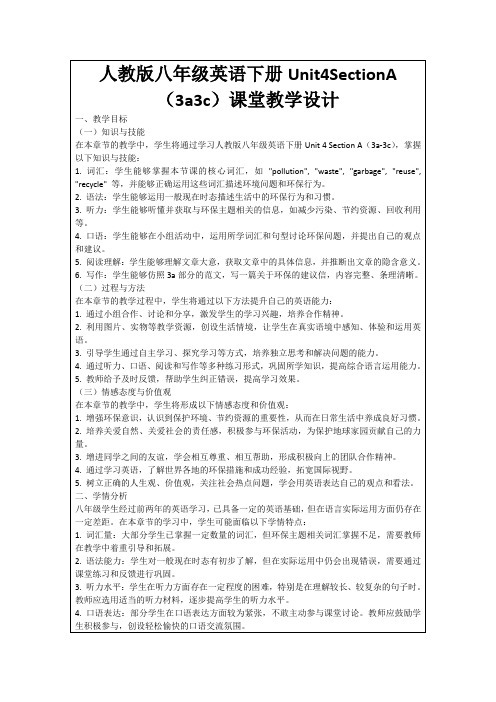
6.写作:写出结构清晰、内容丰富的建议信是本章节的写作重点。
教学设想:通过分析范文结构,提供写作框架,逐步引导学生完成写作任务。
(二)教学设想
1.利用多媒体教学资源,如PPT、视频、实物等,增强课堂教学的直观性和趣味性,提高学生的学习兴趣。
2.采用任务型教学法,设计真实且有挑战性的任务,引导学生通过自主、合作、探究的方式完成任务,提高学生的实践能力。
6.写作能力:学生在写作方面存在结构不清晰、内容单一等问题,教师应通过范文分析、写作指导等方式,提高学生的写作水平。
针对以上学情分析,教师在本章节的教学中应注重因材施教,关注学生的个体差异,激发学生的学习兴趣,提高他们的英语综合运用能力。同时,教师应关注学生的情感态度,培养他们关爱环境、积极参与环保活动的意识。
3.学生互动:学生尝试用英语回答问题,如“Pollution is serious.”、“We need to protect our environment.”等。
4.教学过渡:教师总结学生的回答,引出本节课的主题:“Today we are going to learn how to protect our environment and reduce pollution.”
2.语法:一般现在时态的运用是本章节的语法重点,学生需要掌握该时态描述习惯行为和普遍事实。
教学设想:设计不同场景的口语练习和写作任务,让学生在实际操作中巩固一般现在时态。
3.听力:提高学生在日常语境中获取信息的能力,特别是关于环保措施和建议的听力材料。
教学设想:提供多样化的听力材料,包括对话和短文,并设计相关问题,引导学生逐步提高听力技巧。
4.学生活动:学生跟随教师朗读词汇和例句,并在教师的指导下进行替换练习。
教学设想:通过分析范文结构,提供写作框架,逐步引导学生完成写作任务。
(二)教学设想
1.利用多媒体教学资源,如PPT、视频、实物等,增强课堂教学的直观性和趣味性,提高学生的学习兴趣。
2.采用任务型教学法,设计真实且有挑战性的任务,引导学生通过自主、合作、探究的方式完成任务,提高学生的实践能力。
6.写作能力:学生在写作方面存在结构不清晰、内容单一等问题,教师应通过范文分析、写作指导等方式,提高学生的写作水平。
针对以上学情分析,教师在本章节的教学中应注重因材施教,关注学生的个体差异,激发学生的学习兴趣,提高他们的英语综合运用能力。同时,教师应关注学生的情感态度,培养他们关爱环境、积极参与环保活动的意识。
3.学生互动:学生尝试用英语回答问题,如“Pollution is serious.”、“We need to protect our environment.”等。
4.教学过渡:教师总结学生的回答,引出本节课的主题:“Today we are going to learn how to protect our environment and reduce pollution.”
2.语法:一般现在时态的运用是本章节的语法重点,学生需要掌握该时态描述习惯行为和普遍事实。
教学设想:设计不同场景的口语练习和写作任务,让学生在实际操作中巩固一般现在时态。
3.听力:提高学生在日常语境中获取信息的能力,特别是关于环保措施和建议的听力材料。
教学设想:提供多样化的听力材料,包括对话和短文,并设计相关问题,引导学生逐步提高听力技巧。
4.学生活动:学生跟随教师朗读词汇和例句,并在教师的指导下进行替换练习。
人教版八年级下册英语 Unit 4 SectionA (1a-2d)
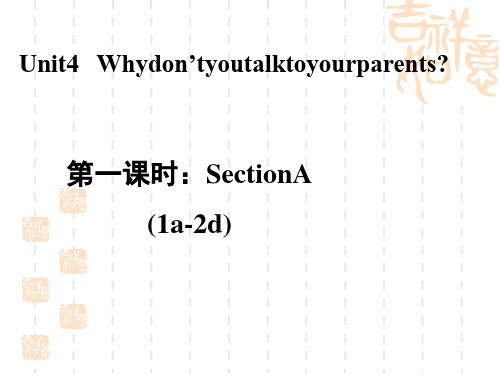
5. You
2a
takehimtotheballgame. ( )
1. Youcould 2. Youshould 3. Youshould say you're a
sorryc.ou(ld 4. Youcould
5. You
Advice
write him a ldetter.(
)
call himeup. (
)
talk to him so that you can
)
c
go to his house. ( b )
take him to the ball game.
2a
Boy 1:Hey, Peter, what’s wrong? Boy 2:I had a fight with my best friend. What should I do? Boy 1:Well, you could write him a letter. Boy 2:I don’t think so, although it’s a good idea. I’m just not very good at writing letters. Boy 1:Maybe you should call him up. Boy 2:No, I don’t want to talk about it on the phone.
b. I don't want to wait that long. c. I don't want to surprise him. d. I'm not good at writing letters. e. I don't want to talk about it on the phone.
人教版八年级英语下册Unit4SectionA(3a3c)教学设计

2.完成课后练习册的相关练习,包括填空、改错和阅读理解,以加深对课堂所学知识点的掌握。
3.观察身边的餐厅,了解餐厅的基本布局和菜单,用英语描述一家你熟悉的餐厅,包括餐厅的名称、位置、特色菜品等。
4.拍摄一段餐厅点餐的视频,与同学分享,互相学习,提高口语表达能力。
5.预习下一节课的内容,提前了解相关词汇和语法,为课堂学习做好准备。
(四)课堂练习
1.填空练习:设计填空题,让学生运用新学的词汇和语法知识完成练习。
2.改错练习:设计改错题,检验学生对语法知识的掌握程度。
3.阅读理解:设计阅读理解题,让学生从文中获取关键信息,提高阅读能力。
4.口语练习:创设餐厅点餐情境,让学生进行角色扮演,练习口语表达。
(五)总结归纳
1.教师总结:对本节课所学词汇、语法和阅读技巧进行总结,强调重点知识。
4.学生在阅读理解方面的能力,教师应引导学生关注课文细节,培养他们获取关键信息的能力。
5.学生在团队合作方面的表现,教师应关注学生在小组活动中的参与度,培养他们的团队协作能力。
三、教学重难点和教学设想
(一)教学重难点
1.词汇和语法:本节课的新词汇和语法是教学的重点,尤其是餐厅场景相关词汇和一般现在时态的运用,以及There be...句型的掌握。学生需要在实际语境中灵活运用这些词汇和语法,以提高口语表达能力。
设想:创设餐厅点餐的情境,让学生进行角色扮演,教师适时给予指导和鼓励,提高学生的口语表达能力。
(二)教学设想
1.导入:通过播放一段餐厅点餐的视频,激发学生的兴趣,引出本节课的话题。
2.新课内容呈现:采用情景教学法,展示餐厅实景图片,结合单词卡片、例句和课文,呈现新课内容。
3.课堂活动设计:
(1)词汇学习:采用单词卡片、例句和作业:设计具有针对性和实践性的作业,如:编写一段餐厅点餐的对话,巩固所学知识。
3.观察身边的餐厅,了解餐厅的基本布局和菜单,用英语描述一家你熟悉的餐厅,包括餐厅的名称、位置、特色菜品等。
4.拍摄一段餐厅点餐的视频,与同学分享,互相学习,提高口语表达能力。
5.预习下一节课的内容,提前了解相关词汇和语法,为课堂学习做好准备。
(四)课堂练习
1.填空练习:设计填空题,让学生运用新学的词汇和语法知识完成练习。
2.改错练习:设计改错题,检验学生对语法知识的掌握程度。
3.阅读理解:设计阅读理解题,让学生从文中获取关键信息,提高阅读能力。
4.口语练习:创设餐厅点餐情境,让学生进行角色扮演,练习口语表达。
(五)总结归纳
1.教师总结:对本节课所学词汇、语法和阅读技巧进行总结,强调重点知识。
4.学生在阅读理解方面的能力,教师应引导学生关注课文细节,培养他们获取关键信息的能力。
5.学生在团队合作方面的表现,教师应关注学生在小组活动中的参与度,培养他们的团队协作能力。
三、教学重难点和教学设想
(一)教学重难点
1.词汇和语法:本节课的新词汇和语法是教学的重点,尤其是餐厅场景相关词汇和一般现在时态的运用,以及There be...句型的掌握。学生需要在实际语境中灵活运用这些词汇和语法,以提高口语表达能力。
设想:创设餐厅点餐的情境,让学生进行角色扮演,教师适时给予指导和鼓励,提高学生的口语表达能力。
(二)教学设想
1.导入:通过播放一段餐厅点餐的视频,激发学生的兴趣,引出本节课的话题。
2.新课内容呈现:采用情景教学法,展示餐厅实景图片,结合单词卡片、例句和课文,呈现新课内容。
3.课堂活动设计:
(1)词汇学习:采用单词卡片、例句和作业:设计具有针对性和实践性的作业,如:编写一段餐厅点餐的对话,巩固所学知识。
- 1、下载文档前请自行甄别文档内容的完整性,平台不提供额外的编辑、内容补充、找答案等附加服务。
- 2、"仅部分预览"的文档,不可在线预览部分如存在完整性等问题,可反馈申请退款(可完整预览的文档不适用该条件!)。
- 3、如文档侵犯您的权益,请联系客服反馈,我们会尽快为您处理(人工客服工作时间:9:00-18:30)。
如果你的父母有问题,你应该主动提供帮助。
offer v.主动提出;自愿给予 offer侧重主动或愿意给予,主动提 出做某事。
• 常用结构:offer to do sth. 主动提出做某事 • offer sb. sth.= offer sth to sb. 主动提供某 人某物 • e.g. She offered me a cup of tea. 她给我端 了杯茶。 • He offered to go instead of me. 他主动提 出代替我去。
SectionA了? You ____ look tired. What’s ___ the _______? matter 2. 昨晚,我一直学习到午夜,因此我没有 睡足觉。 until _________ midnight last night so I I studied _____ didn’t get ___ enough ______ sleep.
What can you think of looking at the picture?
Lead in
1. Can you get on well with your family? Yes, I can. My parents care for me and I like to talk with them. 2. Are the relations between your parents good? I think so. Though they argued sometimes, they get on well with each other most of the time.
7. Instead he watches whatever he wants until late at night. 1) instead adv. 代替;反而;却 e.g. If we can’t go to Huashan Mountain, we’ll go to the city of Xi’an for the trip. 如果我们不能去爬华山,我们就去西安 游玩。
2)mind sb / sb’s doing sth 介意某人做某事 I don’t you smoking here。 3) all the time 一直
11.I hope things will be better for you soon,我希望事情将会很快好转。
• • • • •
hope that从句 hope to do sth wish that 从句 wish to do sth wish sb to do sth
Read again and fill in the blanks.
1. Sad and Thirteen has some _________. problems He get on with his family. His parents can’t ____________ fight a lot. It’s the only communication _____ ______________ to do they have. He doean't know_______When they argue _____, it’s like a big black cloud ____________ hanging over their home. He doesn’t like it.
2) secondly adv. 第二;其次 辨析: second和secondly
second用作序数词或形容词, 意为“第 二”,常修饰名词。 secondly是副词,意为“其次,第二”, 常用来修饰整个句子。如: First, it’s very expensive. Secondly, it’s ugly. 首先,它很贵。其次,它很难看 。 The second day of a week is Monday. 一周的第二天是星期一。
4.When they argue, it’s like a big, black cloud hanging over our home.当他们争吵的 时候,就像有一大团乌云笼罩在我们家。
• • • •
argue 争吵 →argument n 争论 have an argument with sb.与某人辩论 argue with sb. 与某人争吵 argue with sb. about sth 为某事与某人争 吵 • argue about sth 争论某事
2) whatever pron. 任何;无论什么 相当于 no matter what e.g. Whatever I suggest, he always disagrees. 无论我提什么建议,他都不同意。 8. If your parents are having problems, you should offer to help.
2. Robert Hunt thinks Sad and talk about these Thirteen should __________ feelings to his family. He should _____ offer to help.
1. My problem is that I can’t get on with my family. get on with和睦相处;关系良好 =get along with。
e.g. It isn’t a good way to argue with others to solve a problem.
e.g. The couple began to argue about the child’s education. 那对夫妇开始就孩子的教育问题争吵。
hang over 挂在......之上 hang out 闲逛
instead是副词,常置于句子末尾。 instead of是介词短语,后接n、 pron、v-ing等,放句中。
例如: Last summer I went to Qingdao. This summer I’m going to Dalian instead. 去年夏天我去了青岛。今年夏天我要去大 连。 Instead of going to Qingdao I’m going to Dalian this year. 今年我打算去大连,而不去青岛。
3. Do you have any brothers or sisters? Can you get on well with him/her? Yes. I have a brother. We are not good with each other. We always get into fight. He always refuses to let me watch my favorite TV show. 4. Who do you ask for help when you have problems? I always talk to my best friend and ask her for help.
10.You should explain that you don’t mind him watching TV all the time.
1)explain v. 解释;说明 explain + that / what/ why等从句 explain sth. (to sb.)(向某人)解释某事 e.g: Can you explain to me how to do this math problem?
3.It’s the only communication they have. 这是他们仅有的沟通。
• • • • communication n .交流 communicate v.交流 proper communication适当的沟通 communicate with sb和某人交流沟通 eg:If you want to have better communication with your friend, you should communicate with them often.
Revision
3. 我应该做什么? _____ What _______I should do? 4. 你为什么不忘掉此事呢?尽管她错了, 但那不是一件大事。 _____ ____ you forget about it? Why don’t Although she’s wrong, it’s not ____ a _________ ___ big _____. deal
3a Read the article quickly and
answer the questions. 1. What’s Sad and Thirteen’s problem? He can’t get on with his family. 2. How does he feel at home? He always feels lonely and nervous.
be nice to sb. 对某人友好 be good to sb. be friendly to sb.
6.He always refuses to let me watch my favorite TV show. 他总是拒绝让我看我最喜欢的电视节 目 refuse to do sth拒绝去做 refuse =say no to v拒绝 to go ①The boy refused __________(go) to see his father with us. ( B ) ②He refused when I asked him for help. A. said yes B. said no C. said hello
9. Secondly, why don’t you sit down and communicate with your brother? 1) communicate v. 交流;沟通 communicate with sb. 与某人交流
offer v.主动提出;自愿给予 offer侧重主动或愿意给予,主动提 出做某事。
• 常用结构:offer to do sth. 主动提出做某事 • offer sb. sth.= offer sth to sb. 主动提供某 人某物 • e.g. She offered me a cup of tea. 她给我端 了杯茶。 • He offered to go instead of me. 他主动提 出代替我去。
SectionA了? You ____ look tired. What’s ___ the _______? matter 2. 昨晚,我一直学习到午夜,因此我没有 睡足觉。 until _________ midnight last night so I I studied _____ didn’t get ___ enough ______ sleep.
What can you think of looking at the picture?
Lead in
1. Can you get on well with your family? Yes, I can. My parents care for me and I like to talk with them. 2. Are the relations between your parents good? I think so. Though they argued sometimes, they get on well with each other most of the time.
7. Instead he watches whatever he wants until late at night. 1) instead adv. 代替;反而;却 e.g. If we can’t go to Huashan Mountain, we’ll go to the city of Xi’an for the trip. 如果我们不能去爬华山,我们就去西安 游玩。
2)mind sb / sb’s doing sth 介意某人做某事 I don’t you smoking here。 3) all the time 一直
11.I hope things will be better for you soon,我希望事情将会很快好转。
• • • • •
hope that从句 hope to do sth wish that 从句 wish to do sth wish sb to do sth
Read again and fill in the blanks.
1. Sad and Thirteen has some _________. problems He get on with his family. His parents can’t ____________ fight a lot. It’s the only communication _____ ______________ to do they have. He doean't know_______When they argue _____, it’s like a big black cloud ____________ hanging over their home. He doesn’t like it.
2) secondly adv. 第二;其次 辨析: second和secondly
second用作序数词或形容词, 意为“第 二”,常修饰名词。 secondly是副词,意为“其次,第二”, 常用来修饰整个句子。如: First, it’s very expensive. Secondly, it’s ugly. 首先,它很贵。其次,它很难看 。 The second day of a week is Monday. 一周的第二天是星期一。
4.When they argue, it’s like a big, black cloud hanging over our home.当他们争吵的 时候,就像有一大团乌云笼罩在我们家。
• • • •
argue 争吵 →argument n 争论 have an argument with sb.与某人辩论 argue with sb. 与某人争吵 argue with sb. about sth 为某事与某人争 吵 • argue about sth 争论某事
2) whatever pron. 任何;无论什么 相当于 no matter what e.g. Whatever I suggest, he always disagrees. 无论我提什么建议,他都不同意。 8. If your parents are having problems, you should offer to help.
2. Robert Hunt thinks Sad and talk about these Thirteen should __________ feelings to his family. He should _____ offer to help.
1. My problem is that I can’t get on with my family. get on with和睦相处;关系良好 =get along with。
e.g. It isn’t a good way to argue with others to solve a problem.
e.g. The couple began to argue about the child’s education. 那对夫妇开始就孩子的教育问题争吵。
hang over 挂在......之上 hang out 闲逛
instead是副词,常置于句子末尾。 instead of是介词短语,后接n、 pron、v-ing等,放句中。
例如: Last summer I went to Qingdao. This summer I’m going to Dalian instead. 去年夏天我去了青岛。今年夏天我要去大 连。 Instead of going to Qingdao I’m going to Dalian this year. 今年我打算去大连,而不去青岛。
3. Do you have any brothers or sisters? Can you get on well with him/her? Yes. I have a brother. We are not good with each other. We always get into fight. He always refuses to let me watch my favorite TV show. 4. Who do you ask for help when you have problems? I always talk to my best friend and ask her for help.
10.You should explain that you don’t mind him watching TV all the time.
1)explain v. 解释;说明 explain + that / what/ why等从句 explain sth. (to sb.)(向某人)解释某事 e.g: Can you explain to me how to do this math problem?
3.It’s the only communication they have. 这是他们仅有的沟通。
• • • • communication n .交流 communicate v.交流 proper communication适当的沟通 communicate with sb和某人交流沟通 eg:If you want to have better communication with your friend, you should communicate with them often.
Revision
3. 我应该做什么? _____ What _______I should do? 4. 你为什么不忘掉此事呢?尽管她错了, 但那不是一件大事。 _____ ____ you forget about it? Why don’t Although she’s wrong, it’s not ____ a _________ ___ big _____. deal
3a Read the article quickly and
answer the questions. 1. What’s Sad and Thirteen’s problem? He can’t get on with his family. 2. How does he feel at home? He always feels lonely and nervous.
be nice to sb. 对某人友好 be good to sb. be friendly to sb.
6.He always refuses to let me watch my favorite TV show. 他总是拒绝让我看我最喜欢的电视节 目 refuse to do sth拒绝去做 refuse =say no to v拒绝 to go ①The boy refused __________(go) to see his father with us. ( B ) ②He refused when I asked him for help. A. said yes B. said no C. said hello
9. Secondly, why don’t you sit down and communicate with your brother? 1) communicate v. 交流;沟通 communicate with sb. 与某人交流
